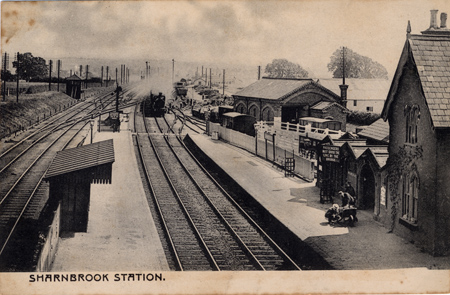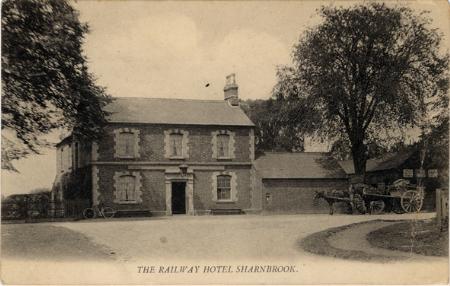Odell Sharnbrook Paths to Crime Walk stop 10 Fordham Arms
Fordham Arms (formerly the Railway Hotel), Sharnbrook
Railway Matters

Sharnbrook Station c,1900s.[ref.Z1306/100/25/2]
Sharnbrook Station was opened as part of the Leicester and Hitchin Railway by the Midland Railway Company in 1857. Construction had begun sometime before, bringing an influx of railway workers into the area. In April 1855 Thomas Saunders of Sharnbrook and his wife Ann took in two of these men as lodgers. On 10th April Saunders left one of the men, Daniel Hagger from Littlebury, Essex alone in the house when he went to work that morning. On his return he found that a box in his room had been disturbed. He heard that the lodgers had left, taking with them a clasp knife and a sovereign which Saunders had put by to pay his rent. The next day the Sharnbrook police superintendent William Byers Graham went to Bedford in pursuit of Hagger and spotted him leaving a lodging house. Hagger also spotted policeman. He dodged back into the house, left through the rear and climbed over a nine foot high wall into a passage belonging to another house. Graham found him in the adjoining house hiding under a staircase. When he was searched Hagger was found to have two shillings and sixpence in cash and a pocket knife, later identified by Saunders as his property. Enquiries established that Hagger had spent sixteen or seventeen shillings during the previous twenty four hours, beginning with three pennyworth of rum at the Star Inn, (situated on the corner of the present day Harpur Street and Silver Street) Bedford where he gave the sovereign in payment. Haggar was sentenced to three months hard labour. A certificate was provided stating that Ann Saunders was unable to attend the Quarter Sessions on 3rd July to give evidence as she was unable to leave her room to confinement. She gave birth to a baby girl named Martha.

The Railway Hotel [ref.Z1306/100/24/1]
Thirty five years later Ann Saunders, or Sanders as she now appears, was involved in another case concerning a lodger. On Tuesday 7th January 1890 she went to the Railway Hotel to buy her customary beer for supper and met a man named Joseph Pugh who asked her to take him in as a lodger for three months. She told him she could take him but not for so long. He promised he would leave when asked to do so and said he would give her three shillings a week for his lodging as he would want a little help. Pugh told her that he was a railway pensioner with a sixteen shilling a week pension who had been in hospital at Bedford and had been sent to the country by the doctor for the good of his health. The next day he asked Mrs Sanders to lend him money to get a doctor's certificate and asked where the nearest doctor lived. She lent him three shillings but he returned later saying that the Doctor, Leonard Philip Banks, would not give him a certificate for less than three shillings and sixpence and asked for another shilling, which she gave him. Pugh told her that he would be collecting his pension from the station then next day. However, he ate his breakfast on Thursday morning, left saying that he was going to the doctor's again, and never returned. Dr Banks said he had never seen Pugh or been asked by him for a certificate. Pugh was arrested at Yardley Hastings on Friday 10th January by Sharnbrook police inspector Ebenezer Cain. Pugh's excuse was that he had left Bedford at ten o'clock on the Tuesday morning, walked for six hours to Oakley, had been unable to get lodgings there so had walked on to Sharnbrook. He had then "felt bad of the diarrhoea" which had caused him to do what he did. He had intended to go on to Blisworth and send the money back to Mrs Sanders. The court found him guilty of obtaining three shillings by false pretences and he was sentenced to one month's hard labour.
Eight years later a case of a very different nature involving the railway was prosecuted at the Quarter Sessions. A twelve year old boy, James Mackness, was accused of endangering passengers by negligently driving two horses and a wagon across the line over a private level crossing. Fortunately the train was a slow one, only travelling at 30 miles an hour. The train driver whistled and slammed on the brakes but was not able to stop the train in time. Luck was on the boy's side as the wagon was just across the line when the engine reached it, although the wagon wheels were not yet clear of the gate post. The driver said that if it had been a fast train, nothing could have prevented a collision. Evidence was given that there was a clear view from the crossing and the engine chimney could have been seen from a mile away and the engine itself from half a mile. However when asked whether he looked to see if there was a train coming Mackness said "No, I never thought nothing about it". Again luck was on his side and he was found not guilty. The census shows that Mackness was born in Wymington and in 1861 was living there with his widowed mother Martha, a lacemaker. He began life as a farm labourer but later moved to Rushden (Northamptonshire), the hometown of his wife Lydia, and worked there as an ironmonger's assistant.
Mackness was not the only youngster to show that adolescent boys, then as now, were prone to thoughtlessness. In 1837 fifteen year old George Osborne was sent by his master James Tate of Northill to take a mare into a clover field to feed, with strict instructions to keep her out of some adjacent beans. That evening the horse was found in the stable bleeding to death. Young George explained that the mare had got into the beans and he could not get her out, so he threw a sickle at her and "accidentally" cut her leg. A veterinary surgeon gave evidence that the leg had been cut to the bone, severing the metacarpal artery. Like James Mackness George Osborne avoided serious consequences as the charge of wilfully killing a mare was not prosecuted at the Quarter Sessions.
References: QSR1837/4/5/10; QSR1855/3/5/6; QSR1863/4/5/14; QSR1890/2/5/1; QGV10/3